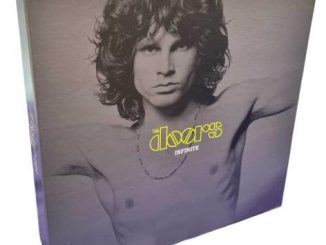Jack White learned his craft listening to the blues legends of the 20s and 30s on albums released by a tiny Scottish label. And now he’s rereleasing Document Records’ archive on vinyl

It was shortly before Christmas when Gary Atkinkson met Jack White just after the latter came off stage at the Winter Gardens in Blackpool. Atkinson runs vintage-blues reissue label Document Records with his wife Gillian in Galloway, south-west Scotland. He and White, whose most recent album was a UK and US No 1, had previously corresponded by telephone and email, but Atkinson fretted that, in the flesh, White might be “one of those shy, Prince types, who recoil at every comment”. So when the former White Stripe bounded across the room and hugged him, he was taken aback.
As stars tend to do on these occasions, White asked his visitor, at 57 two decades his senior, and a musician himself, what he thought of the show. “I said: ‘Well, you’re good and you know you’re good,'” remembers Atkinson, a wry and cheeky Yorkshireman. “‘But you’re a bit loud. And you could do with one or two numbers that everybody can sing along to.’ And we just killed ourselves laughing.”
In fact, the pair got on so famously that they spent the remainder of he evening listening to obscure 1920s blues recordings on White’s laptop, until eventually White’s entourage had to drag him away with the star pleading: “Let’s just listen to one more.”
So began the unlikely coupling between the superstar’s Nashville-based Third Man label and Bladnoch-based Document. This month, White’s label begin releasing out-of-print selections from Atkinson’s mammoth back catalogue of 1920s and 1930s Mississippi Delta blues – what they call “vital, breathtaking recordings; the building blocks and DNA of American culture. Blues, gospel, R&B, soul, Elvis, teenagerism and punk rock” – on vinyl, a format Document abandoned 20 years ago.
The linkup was first mooted months earlier when Atkinson had taken the sort of call any smaller label could only dream of. His wife shouted upstairs: “Jack White’s on the phone!” However, as both men remember it, it was – implausibly – White who seemed overawed, gleefully confessing: “I can’t believe I’m talking to the people who own Document Records.”
While Atkinson listened intently, White told him that the first records he had ever bought were on Document, and they became the major influence on his career. The White Stripes even covered songs by Blind Willie McTell and Son House, who had come to his attention via the Scottish-based imprint.
“We even had a Document Records tribute on the White Stripes’ albumElephant,”White remembers. “The same distinctive black-and-white artwork, the fonts, everything. Vinyl was the romantic side of listening to blues, because it involves the listener from the smell of it to the process of dropping the needle on the record.”
Ever since becoming a star and setting up a label of his own, White had wanted to make those recordings available on vinyl again, and in Atkinson recognised someone he could work with.
“There are a lot of people around you who can be negative, and not understand what you’re trying to accomplish,” says White. “Especially in folk and blues. It’s not a popular artform, or easy money. You don’t determine whether you want to work with someone based on what they can do for you or how much they can namedrop. It’s on how much you can tell that they love what they’re involved with.”
It is obvious why the pair hit it off: both are blues enthusiasts, not purists, and combine an encyclopedic knowledge with a lot of mischievous laughter about the music they love. White remembers how the White Stripes had so many “obfuscations” – their costumes, their raucous guitar and drums – that people didn’t consider them a blues band at all.
“It was always shocking that people started caring after three albums,” White admits, a decade after White Blood Cells turned him and then wife Meg into superstars overnight. “What, now people are getting it?! We’d assumed it was a style of music that nobody would be into and had resigned ourselves to always playing to 50 people. It was good for us, because we’d made up our minds to never care about that, and that’s when success happened. It was sorta weird like that, but I think if we’d have watered it down it wouldn’t have worked.”
The Atkinsons, meanwhile, are also fans of bands such as the Fall and the Stranglers, and Gary relishes the more apocryphal blues mythology – tales of precious master tapes being used to repair chicken coops, and artists such as theMississippi Sheiks‘ Walter Vinson, who gave up his job in the fields and took off with his guitar proclaiming: “I’m not going to spend the rest of my life behind a mule that’s farting.”
White got the blues bug in his mid-teens. While his peers in his Detroit neighbourhood listened to chart music and the grunge/rap music of the early 1990s, the future White Stripes/Raconteurs/Dead Weather musician grew up in a house with six older brothers and three older sisters, being subjected to old-country music and rock’n’roll.
“Then someone died, and their family sold their entire blues collection to a Detroit record store,” he remembers. “They were all numbered, in the corner. I got there a coupla days late. A lot of the better records had gone, so I got to buy a lot of records I’d never seen before, by Tommy Johnson, Blind Boy Fuller, Mississippi John Hurt, Blind Willie McTell and all these people. I bought as many as I could – 30, 40 of them.”
White soon realised that he could just buy any record on Document without having heard it because he trusted the label. “I could learn so much about songwriting and the blues from those records. So I did whatever I could to get hold of that stuff.”
As he tells it, the enduring appeal is simple. “As a songwriter, even if you’re singing about other people or making up characters, it’s still your job to be against the world and that all began in the 1920s and 1930s with these blues singers. It was the first time in history that a single person had been recorded to tell whatever story they had to the world. Before that you had to be in a German polka band with a tuba, or jazz orchestra …” He honks with laughter. “But suddenly anybody – they didn’t even have to be good singers – could have their own voice.”
White is still in awe of the process by which events came together in America’s deep south to create the blues. There was the Great Depression, the technology of recording music and the fact that furniture makers had started making record players, and needed something people could play on them. So they started recording the poor black singer-guitarists that were emerging in the Mississippi Delta. “Something magical just occurred to create a moment in history that changed the world.”
There is something magical about those records, and much of it lies in the voices. Partly because of the way they were recorded, there’s eeriness and a humanity about them, which sounds unlike anything else.
“They sound like they couldn’t have occurred for real,” White agrees. “They don’t sound like you could have listened to these songs being recorded. I can’t imagine the white northern people in charge of the record companies saying: ‘Great job,Robert Johnson. Let’s hear another one!’ It was such strange music. You can imagine them thinking, ‘I do not understand this stuff or what they’re saying. Why are we recording this kind of music?'”
The Third Man/Document reissues – remastered from original 78s – will benefit from modern remastering techniques without losing their inimitable appeal. “Chess Records recorded Little Walter with his vocals coming through an industrial pipe,” hoots Atkinson, reeling off another tale. “Rock-blues bands in the 1960s like the Stones and the Yardbirds were going mad because they were trying to get that sound. If they’d have gone to a building suppliers they’d have cracked it.”
The process by which this weird, wonderful music from the delta ended up in Scotland is a story in itself. Document was originally started in Vienna in 1986 by jazz and blues fan Johnny Parth, an Austrian who had first heard Mississippi blues when American GIs brought the records to Europe during the second world war. Atkinson, meanwhile, was a screen printer in Hull who reviewed records in his spare time. One day, he was given a set of Document CDs to review. “I absolutely thrashed them,” he chuckles when we meet in a Manchester cafe. “But then I got another batch and realised this Johnny guy was on a mission from God.”
A traumatic divorce from his first wife meant Atkinson was left floundering, unable to do his job. However, around the same time as he met second wife Gillian – a big character and blues fan who had met Bo Diddley “and almost run off with him” – who would soon help run Document, Atkinson landed control of the label.
He had been writing sleevenotes for them – and being paid in CDs – when he suggested to Parth that Document needed a website, upon which the Austrian told the Yorkshireman that he should go ahead and create one.
“About two or three days later he said: ‘Would you like all of Document?'” recalls Atkinson. “I thought he was talking about the CD collection. Then it tumbled. He was talking about the company. He gave me this daft price, but it wasn’t what it was worth by any means.”
Atkinson, by no means wealthy, started to worry about what he had done when he realised acquiring the company meant taking ownership of 175,000 physical CDs, spread across 900 albums. Indeed, there were so many that they had to close the street to get the truck in. In southwest Scotland, where the Atkinsons were living, there was nowhere suitable to house a century’s worth of music. “It all ended up in a warehouse in a whisky distillery,” chuckles Atkinson. “You’ve only got to think of Tommy McClennan’s Whiskey Head Woman [1939] to realise they were coming home.”
Now some of them are on the move again, via Nashville. Third Man is initially releasing the complete recorded works, in chronological order, of three legendary artists, complete with new sleeve artwork by collectable artist Rob Jones. They will also have sleeve notes that explain the blues’ importance to the development of rock and pop. White considers Charley Patton – whose Vol 1 collection is among the first Third Man/Document releases – to be a precursor of Jimi Hendrix, who would play “behind his neck, through his legs, doing anything he could.
“Sometimes he’d just hit his guitar with his hand and sing a capella while people danced,” he continues, incredulous. “He was such a bizarre character, almost like an alien. Like Hank Williams or Michael Jackson, what these artists exude just seems unearthly.”
Similarly, White regards 1930s guitar and fiddle group the Mississippi Sheiks as the first rock’n’roll band, maybe even the first punks. “This was the early days of a group of people getting together to plan an attack. They were irreverent, too. We forget that in the 1920s in America you could have nudity on film, and the censorship on records came later. These guys were saying very irreverent things about sex and racial relations that you’d think they wouldn’t get away with. The first song on the Mississippi Sheiks’ record is Driving That Thing.” Another honk of laughter. “The early rock’n’rollers were singing about cars as metaphors for women, but this was happening in Mississippi 30 years before.”
It wasn’t all so overt. In the White Stripes, White covered Your Southern Can Is Mine by Blind Willie McTell, the third artist in the initial series. “I love that phrase,” he says. “At first I thought: ‘Your can? What are you talking about? A cup of coffee? Then I realised he’s talking about her ass: ‘Your ass is mine!’ That side of it is clear, but people think he was also singing about white ruling classes in America. He was very knowledgeable and knew what he could get away with. Even in interviews, you could tell he had a great sense of racial relations and how defiant he really was. To be blind, black and southern, he had a lot of strikes against him and his lyrics showed just how intelligent he was.”
Bob Dylan once sang: “No one sings the blues like Blind Willie McTell,” and like Dylan, White’s passion for these artists and their legacy is undeniable.
“Dylan could have sung anybody’s name and he used McTell’s to make a point that all these things have happened in the world and there is still somebody that’s going to scream about it,” says White. “McTell talks about power and greed and corruptible seed. That’s a far cry from, ‘No one sings the blues like McTell.’ But he’s saying that it’s been said before and will be said again, but these were the first people to say it.
“It’s important to go back and cleanse your palate,” he argues. “If you like punk rock now, there were people who did this with way more things against them than a suburban kid who goes to a guitar shop or someone buys him one and he starts singing punk songs. There’s beauty in that, too, but to be black and Southern in 1920 and have no rights … that exemplifies struggle.”
White, of course, no longer has to struggle, but deserves credit for using his success and fame to promote musicians that are far from household names. “The beauty of Third Man Records is we’re not in business to make money. That sounds pretentious, but it’s true,” he argues. “We’re here to make things exist that we think are beautiful. Some people might go out and buy a Ferrari or something, but I would rather spend my time and energy in releasing these records. If only a thousand people get something out of them, it’s still something that makes me and the people here feel excited, because they know the power of this music.”
Clearly as fired up by this as anything he’s been involved with, White hopes that the reissues will ensure Document’s survival, and that his patronage will bring the artists to a new audience – his audience – who may otherwise never get to hear them.
“Right now, a teenage kid could listen to the blues and open his or her eyes into a whole new world,” he says, “and turn into the next Stanley Kubrick or something, or something else not directly related to the blues. If anyone can learn about art and creativity through something we made exist, that’s very fulfilling and worth every penny spent.”
Reborn: three blues legends
The first artists to have their complete recordings re-released by White’s label
Charley Patton Often called “the father of the Delta blues”, Patton’s influence reverberates through popular music. He has been namechecked in song by Bob Dylan and Mercury prizewinners Gomez. His late 1920s Paramount recordings made him the biggest-selling blues artist of his generation.
Blind Willie McTell An enigmatic, ghostly presence in blues history and major influence on Bob Dylan, William Samuel McTier never enjoyed a hit in his lifetime. A growing posthumous reputation was sealed when Dylan eulogised him in the 1983 song named after the blind, 12-string guitarist.
Mississippi Sheiks The Boston, Mississippi band were stars before the Great Depression, shifting several million copies of songs such as Sitting On Top of the World, subsequently recorded by Jack White, Howling Wolf, the Grateful Dead and Frank Sinatra.
This article is from the Guardian Website




Be the first to comment